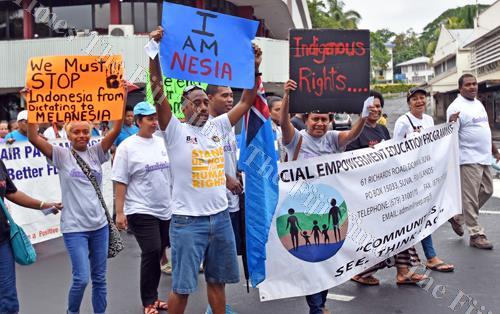THE denial of a permit by police to workers preventing them from marching in Suva on April 7 to highlight their grievances is the latest example of human rights suppression. This is despite Fiji proclaiming itself to be a genuine parliamentary democracy.
This denial without any reason constitutes a breach of freedom of assembly, freedom of expression and freedom of association.
It is a painful reminder that, despite Fiji supposedly returning to parliamentary democracy in 2014 after seven and a half years of military rule, fundamental rights and freedoms remain under siege.
Gross violations
The gross human rights violations after the military coup of December 5, 2006 to just before the September 17, 2014 General Election are well documented in reports compiled by reputable international agencies including the US State Department.
These include detentions and arbitrary arrests by the security forces, the stoning of homes and offices of pro-democracy activists, the imposition of the public emergency regulations, torture and most tragically, even deaths.
Retirees who were pensioners under the Fiji National Provident Fund were penalised, with their pensions significantly reduced in a blatant and unilateral breach of their contract with the pension fund.
Some of those supporting a brutal and dictatorial regime back then had described human rights violations as part of an evolving democracy.
Civil servants and heads of statutory organisations were arbitrarily terminated and forced out of office.
Decrees promulgated by the military regime were regarded as supreme over tribunals or courts.
These decrees are entrenched under Section 173 of the Constitution. Effectively the Constitution is subservient to these decrees.
Post elections
Human rights violations have continued, if not brutally but more subtly. The 2013 Constitution, imposed on the people of Fiji by its tight-knit group formulators, is being described as a document that is progressive and “unprecedented” in protecting fundamental rights under its Bill of Rights.
But the Constitution’s Bill of Rights is full of limitations. Almost every right has a caveat.
These restrictions are then made watertight by decrees (incredibly called “Acts” despite not being brought to Parliament for ratification).
This defining of decrees as Acts is in itself a violation of principles of law making in a parliamentary democracy.
The media for all intents and purposes is still under censorship, mostly self-imposed because of the Media Industry Development Authority Decree 2010.
Trade unionists and staff are prohibited from becoming members of, or even supporting political parties under the Political Parties (Registration, Conduct, Funding & Disclosures) Decree.
Civil servants are subjected to arbitrary contracts and forced to retire at the age of 55.
The civil service reforms are farcical and out of step with international labour and human resource management norms. There is no permanent tenure of employment, putting at grave risk their right to security of employment and their duty to be politically independent.
Despite what Government says, there is no meritocracy in recruitment for jobs in the civil service.
It is riddled with nepotism as we have repeatedly pointed out in Parliament. The list is endless.
It is therefore extremely hypocritical of the current Government to seek a seat on the UN Human Rights Council in 2018.
NFP will uphold human rights
Chapter 10 on Immunity provisions in the 2013 Constitution, effectively pardons any human rights violations committed between December 5, 2006 and the resumption of parliamentary democracy in October, 2014. So, this Government will not change anything as the immunity provisions are irrevocable.
An NFP government will:
1. Repeal all the decrees that violate human rights like the MIDA Decree and Political Parties (Registration. Conduct, Funding & Disclosures) Decree;
2. Elevate consensus building and dialogue with a view to changing the 2013 Constitution;
3. Repeal employment laws and civil service reforms that discriminate against meritocracy, tenure of employment, and promotions; and
4. Retrospectively address and seek to compensate cases of all human rights violations with the aim of providing the victims with justice, closure and compensation.



